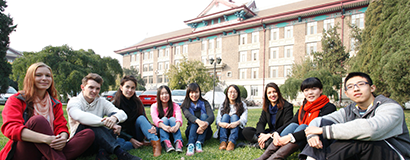
Jin Wensi, the first Chinese in GATT negotiations
Jin Wensi (1892-1968), originally from Jiaxing, Zhejiang, obtained his Bachelor of Laws from Peiyang University in 1915 and was admitted to the Ministry of Foreign Affairs as a trainee of the Administration Department. In 1917, he was dispatched as a trainee to the Chinese Embassy in US, and became an assistance to Gu Weijun, Minister of the Chinese Embassy in US. In the same year, he went to Columbia University and obtained a Master of Laws.
As a professional diplomat, Jin Wensi attended the Paris Peace Conference, Conference of Washington, and sessions of the League of Nations. It was during WWII when he successively served as a Chinese minister (ambassador) to The Netherlands, Belgium, Czech Republic and Norway.
In his Memoirs of Diplomatic Work, Jin Wensi recorded a story about his arrival at his post as the Minister to Netherlands. In July 1941, right after Jin arrived in London Great Britain, he paid a visit to Eelco van Kleffens, Minister of Foreign Affairs of The Netherlands. After exchanging greetings, Kleffens asked him whether it was the pressure the Chinese government received from the German government that had caused Jin’s delayed arrival a year later and said “we’ve been acquainted for 20 years. I earnestly expect a candid answer.” Jin Wensi answered right away that was not the case at all and explained that he had to wait for a transit visa from Spain and yet the problem was that China did not recognize the Franco government of Spain. Kleffens expressed his understanding. Jin Wensi was telling the truth but not the real reason for the delayed return to office. The real reason lay in the fact that China was at war, and there were many obstacles within the administration at home. The story shows the difficult work diplomats had to deal with during the war times.
Jin Wensi was different from the other diplomats during the time of the Republic government; he was also well-known to be very knowledgeable about tariffs. He was the chief representative of the Chinese delegation in the negotiations of the General Agreement on Tariffs and Trade (GATT), virtually “the first Chinese at the GATT negotiations”. He paid close attention to tariff issues in the early years. He served in 1923 for a short period of time in the Ministry of Finance of Peiyang government and studied tariff issues. He was soon transferred to the Ministry of Foreign Affairs to work as the Division Chief of the Taxation Sector of the Finance Department. At the same time he served at the Preparatory Office of Special Meetings on Tariff. Since then, Jin Wensi had been attending tariff negotiations between China and other countries, making efforts for the Republic government to regain tariff autonomy. What is most worth mentioning is his major contribution to the signing of the General Agreement on Tariffs and Trade.
After WWII, Jin Wensi, as the chief delegate of the Chinese Delegation, attended a sequence of meetings regarding the signing of the General Agreement on Tariffs and Trade. Jin emphasized in the meetings that participating countries should not limit their focus to merely two issues of “Full Employment” and “Removing trade barriers”, but shift their due attention to the countries that had suffered major damages in WWII, especially of the economic development of the underdeveloped countries. He also stated that, for countries like China with long-term trade deficits, the import of luxury goods and non-essential items should be tightened while that of necessities should be increased to preserve foreign exchange resources. Jin insisted that an import quota be set. The idea received affirmative responses from India and other developing countries.






